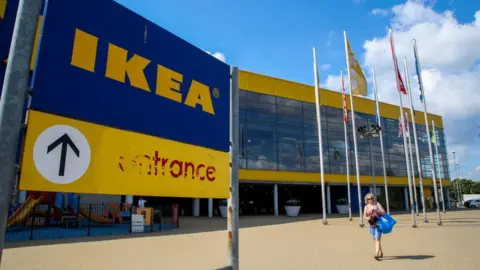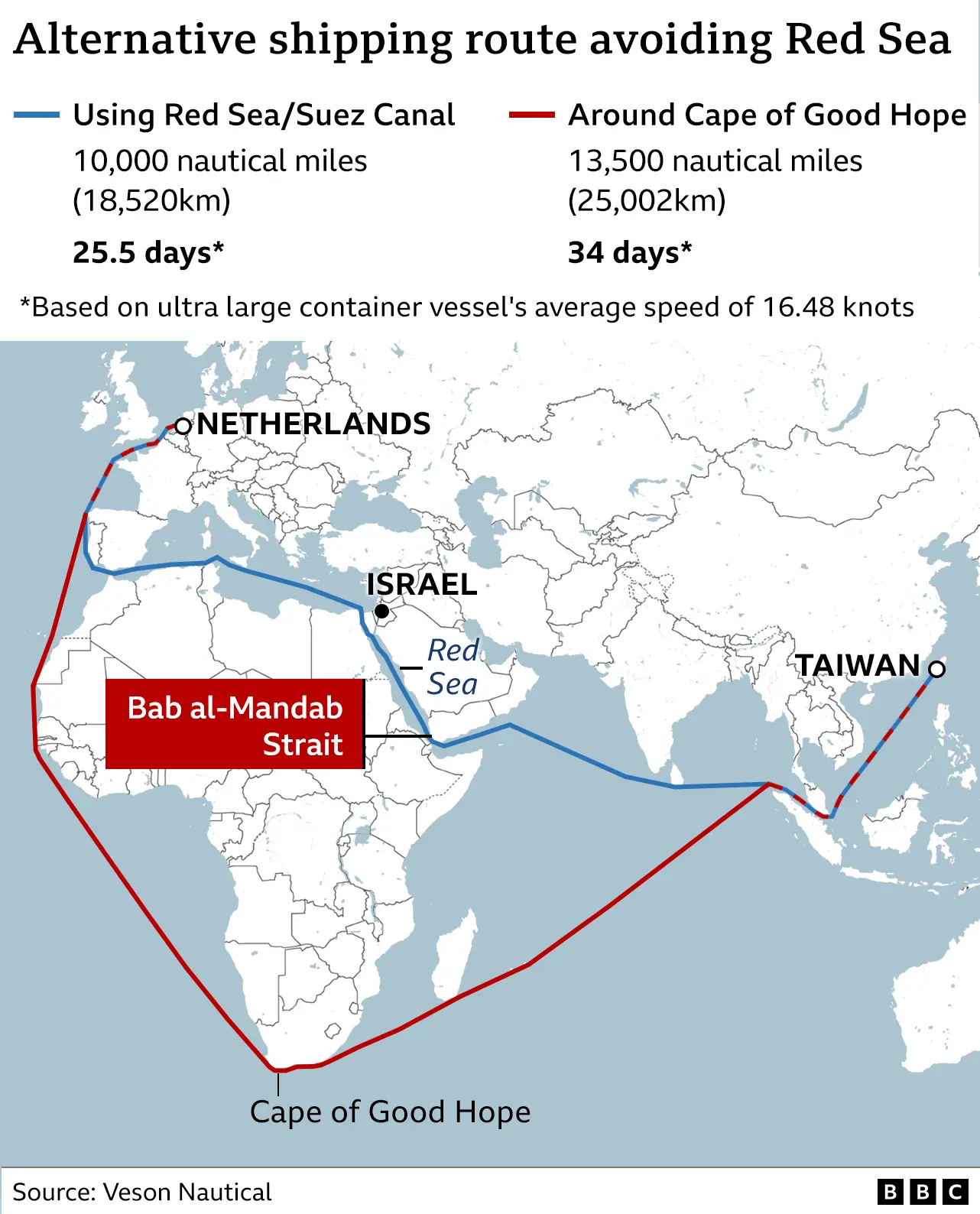Ikea warns of product delays after Red Sea attacks
 Getty Images
Getty ImagesFurniture giant Ikea has said supplies of its products could be delayed following rebel attacks on ships using the key Red Sea trade route.
Several firms have paused shipments through the route after vessels were attacked by Houthi rebels in Yemen.
It has forced a number of companies to re-route cargo around Africa's Cape of Good Hope, adding days to journeys.
But one major shipping firm claimed the disruption will not lead to empty shelves in shops.
Houthi militants in Yemen have stepped up attacks on vessels since the start of the Israel-Hamas war in October.
Iran-backed rebels have used drones and rockets to target foreign-owned ships transporting goods through the Bab al-Mandab Strait and the Suez Canal.
A spokesperson for Ikea said: "The situation in the Suez Canal will result in delays and may cause availability constraints for certain Ikea products."
They added that the firm was looking for other options to ensure its products will be available to customers.
The alternative shipping route, around the Cape of Good Hope, adds about 3,500 nautical miles to the journey and takes about 10 extra days.
Supply chain research company Project 44 has said items could start to be missing from shelves by February.
Andrew Opie, the British Retail Consortium's director of food and sustainability, told the BBC the current crisis would not have any effect on the holiday season as those products are already in the UK, but warned: "In the longer term, some goods may take longer to be shipped, as they are routed via longer routes."
As well as delays to products, longer journeys will increase shipping costs which could have an impact on prices that customers pay.
Shipping analysts Xeneta estimate every journey between Asia and Northern Europe could cost an extra $1m (£790,000).
"This is a cost that will ultimately be passed on to consumers who are buying the goods," said Peter Sand, chief analyst at Xeneta.
Nils Haupt, head of corporate communications at shipping firm Hapag Lloyd, told the BBC's Today programme that bookings for new freight trips are set to cost more.
However, he added that transport costs were a relatively small part of the overall costs of most products, so he did not expect consumers to see a "huge increase" in prices.
Mr Haupt also said that the disruption was not as bad as that seen during the Covid pandemic. "Yes, it is challenging, but it will not mean that we will have empty shelves in the shops," he said.
Oil giant BP said on Monday that it would temporarily pause all shipments of crude through the Red Sea. Rival Shell is not commenting on the situation.
The decision by BP and other tanker firms to seek alternative routes led to fears that oil prices would rise, creating a knock-on impact on energy prices for consumers.
However, so far, changes to the oil price have been modest. The price of Brent crude is currently around $79.50 a barrel having started the week at about $77.

Other companies are keeping a close eye on the region.
Electrolux has set up a taskforce with their carriers to look at a number of measures including "re-routing, identifying extra time-sensitive deliveries and finding alternative routes, if needed". It said it expected any knock-on effect on deliveries to be limited.
Dairy giant Danone told the BBC that it was working with suppliers and partners to monitor the situation closely.
Jorden Freight, based at Felixstowe, handles "pretty much everything", according to its global freight manager Luisa Fletcher.
The freight forwarding firm works with large and small retailers to bring in goods such as food, furniture and building materials.
Ms Fletcher said the Red Sea route is "absolutely essential" and if ships continue to avoid it then the impact on supplies could be seen by the end of January.
Prices could also rise, with shipping firms adding emergency risk surcharges for those still using the Red Sea and emergency diversion surcharges for those using other routes.
The attacks have led the US to launch an international naval operation to protect ships in the Red Sea route, and countries including the UK, Canada, France, Bahrain, Norway and Spain have joined.
Shipping firms have welcomed the plans but can not yet determine when it will be safe to resume using the Red Sea, which could mean the disruption continues for some time.
Mr Haupt said Hapag Lloyd would only use the Suez Canal and Red Sea "when it's absolutely safe and secure for our crews, for our vessels, and the cargo and board of our vessels".
